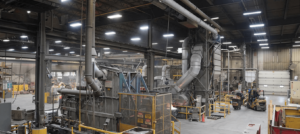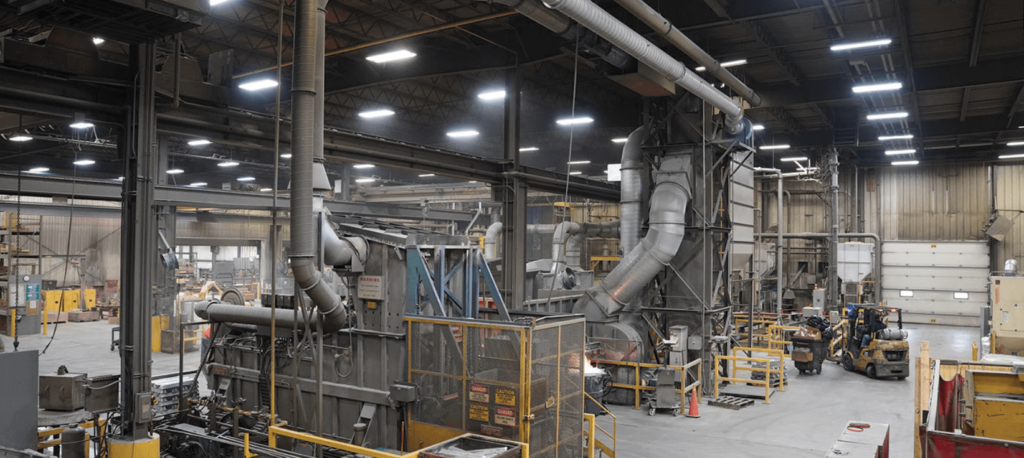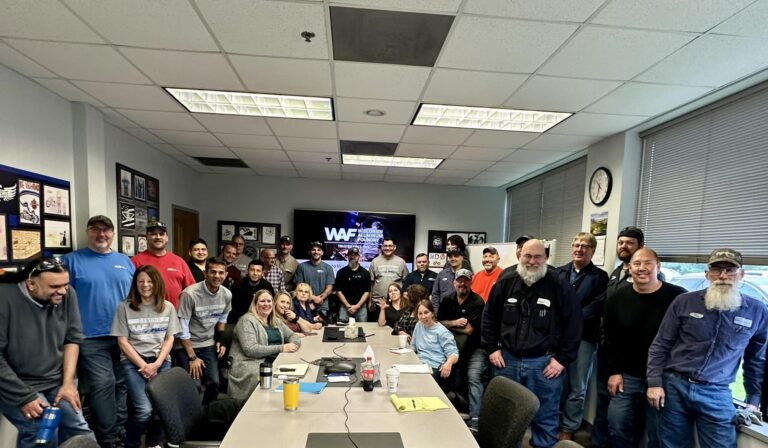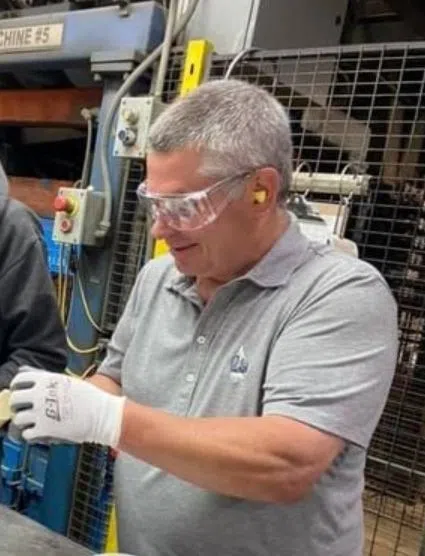DARING TO LISTEN

“Going where others fear to tread” may teeter on the edge of hyperbole, but it accurately characterizes a radical commitment seen at AFS Corporate Member Wisconsin Aluminum Foundry (WAF). But living a culture of intentional, uncensored listening to employees is a risk the company is willing to take. The reward of reputation as an employer that cares about quality of life as much as quality of castings is worth it, according to the leadership duo, CEO Sachin Shivaram and Foundry President Bob Braun, who ascribe great value to what their people think.
The plainest evidence is also the company’s most vulnerable demonstration of a speak-freely environment: Management dared to create an employees-only Facebook Group. While some companies across America are busy writing and enforcing stringent social media policies, WAF has thrown open the door for honest expression that is public enough yet harbors all remarks within a private virtual community. It can be a tough crowd at times, and Shivaram takes every criticism seriously, whether someone’s complaining about the turkey at a company catered buffet or publicly calling out the CEO about a problem in the plant.
“We are tirelessly engaging our employees, said Shivaram, who comes to his role with transparency and humility. “Very controversially, we have this Facebook page where people say whatever they want. Just a little while ago, I was called ignorant! An employee said I didn’t know what I was talking about on a certain ventilation issue, and, well, he was right! So I met with him, and we ended up putting in a new air makeup unit to improve the situation. This sort of brutally honest engagement with people is what employees want, not the once-a-quarter town hall meeting where management speaks at you and then you go back to your job.
“We’ve got to meet people where they are,” he added, “show them we genuinely do care, and I think that makes a difference. It sounds cliché but we say it and then they see it. And that’s actually our approach to labor shortages: How do we just be a more compelling place to work.”
Being heard is just the beginning at the Manitowoc, Wisconsin-based company that employs 580 people across four separate business units and two states. With a collaborative, generous mindset that’s counterintuitive to corporate stereotypical stinginess, WAF has become a very pro-union company, said Shivaram, and routinely expresses its support of the machinists’ IAM and two local USWs under its roof. The wage is competitive as well.
“Our median wage is $29 an hour, and our starting wage is $24.79,” Shivaram said. “They get bonuses based on financial performance of the company, they get bonuses based on individual performance, we pay a $400-a-month childcare subsidy, and we do our health care as gold standard. These are things the unions have urged us to do over the years, and it has really distinguished us today. We have about 15 to 20 interviews every week, and we’re hiring probably six to 10 per week.”
He added the company has assembled a coalition of 20 other local businesses with plans to create their own childcare center, which will not only provide quality care that gives parental peace of mind, but will also accommodate flexible hours for those working the second-shift, the most difficult shift to hire for because of limited options for anyone with kids—particularly women, he said.
Two years ago, WAF also implemented a transparent incentive plan that creates individual goals in sync with openly communicated company goals for operating profit and working capital. Bonuses are then meted out according to how the employee and his or her business unit performs. Keeping the system fair and objective, Shivaram releases monthly financials so team members can calculate exactly what their bonuses will be.
Who Are These Guys?
Braun, who was 16 when he started working part-time in the foundry in 1976, describes WAF as a job shop in the purest sense. It serves over 200 customers a year with more than 5,000 active jobs that include, among others, heavy-duty truck, automotive, marine, oil, agriculture, defense, and medical industries, as well as—in a deliberate, self-preserving swerve away from the internal combustion engine market—electric vehicles such as Tesla and a number of other recent contracts. Specializing in permanent mold, green sand, air set, and low-pressure casting, the company excels in challenging parts and produces some that exceed 1,300 lbs.
Able to accomplish a one-off for a local inventor as readily as production runs of 1,000 to 5,000 a year for a major OEM (think Deere, Caterpillar, Borg Warner, IHI Turbo, Whipple, Magnuson, and other big names) WAF offers high-end engineering support through product design and development, and safely asserts nary a job has come through the doors on which they haven’t improved the castability.
“From a sweet spot perspective, it’s the more complex parts,” said Braun, “with additional cores and higher-end quality requirements, both from a structural standpoint and a dimensional standpoint, and then throw cosmetics on top of it, because we have many parts that are cosmetically critical.”
Braun recalls one challenge that illustrates his team’s ability to overcome design foibles and meet demanding OEM requirements. The part was a hydraulic cylinder for an expensive piece of John Deere ag equipment, numbering about 20,000 per year, and the manufacturer was receiving failure complaints from their customer but zero improvement from their supplier.
“We had several meetings with them at their facility, drove samples down multiple times over a couple of months during testing,” Braun said, “and really perfected the part to where, this year, they’re going to use close to 100,000 of those housings, and it’s basically running at 0% scrap. We’re supplying it cast, machined, and coated, and we’re installing the steel insert. So it literally goes right to the assembly plant ready to put on the piece of equipment. They have a lot of requirements, but we’re succeeding at a very high level and meeting them all.”
The 113-year-old company also produces a proprietary line of high-end, niche consumer products, chief among which is its robust ALL AMERICAN-branded pressure cooker that represents 15% of gross sales. “Built like a tank,” according Shivaram, these are also a preferred tool for sterilization in the medical industry, thanks to a design that uses a metal seal rather than rubber, which deteriorates and also promotes bacterial growth; in fact, one of WAF’s largest customers is UNICEF, which distributes the products to third-world countries. Whirlpool is another major buyer.
For Shivaram, who took the helm in mid-2019, “sweet spot” is less about product range or casting method and more about the totality of service the company provides.
“We offer very short lead times—three to five weeks,” he began. “We can handle transfer tooling. We make our own patterns. We have this end-to-end vertical integration that enables us to juggle our schedule around every hour of every day. We do impregnation in-house, we do heat treating in-house, we have our own machine shop. We can get it all done very quickly. That’s the sweet spot … This job-shop type of work—that’s where we really shine.”
WAF’s emphasis on providing numerous value-add services stems from direction of the Schwartz family owners, whose Jewish ancestor, Russian immigrant Abraham Schwartz, evolved his scrap business into a foundry in 1909. Focused on removing any obstacles that may interfere with expediting customer orders, the company has opted to shed its dependence on others and own many pre- and post-casting services itself, and a big part of that was achieved through the acquisition of Manitowoc Pattern & Machining in 2017. In the past, Shivaram noted, customers reduced cost by coordinating separate services themselves among diverse suppliers, but he finds the appetite for such process-juggling is substantially diminished today. Customers simply want the foundry to handle everything, he said, which is why, for WAF, value-add is not a margin play.
“It’s a matter of, how can we be quicker and have more under our control to deliver what our customer wants,” he said. “To give you an example: About a year ago, Borg Warner had a part sourced from a foundry in Mexico that had shut down with very little notice. So they came to us, knowing we had a machine shop and are fully integrated. We were able to utilize transfer tooling, made modifications in-house because we have our own pattern shop, and did the whole thing––eight permanent molds. We readjusted our entire machine shop schedule to fit this thing in right away. And we got it done in 12 days.”
Acquisition Transition
The business has used the tool of acquisition for more than value-add and has addressed some of its project overload by channeling many orders from its two maxed-out foundry buildings in Manitowoc to its newly-acquired Wabash Castings plant, Wabash, Indiana, purchased April 1, 2021. The automation of a George Fisher molding machine was an immediately-realized coup, according to Braun, who said it can produce 200 pressure cookers an hour compared to 12 per hour in Manitowoc. The capability for high-speed, complex casting is proving lucrative for a variety of jobs, including the performance automotive space.
“We’ve had our growing pains, but I think as we work our culture into their organization, it’s going to be a great long-term fit for Wisconsin Aluminum,” he said.
Private equity ownership had operated Wabash Castings on a bare-bones basis, said Shivaram.
“Literally on Day 1, we raised wages by $2,” Shivaram said. “Since then, we have been doing the sort of fun stuff that we do in our culture—having outside-of-work events, having fun at work, collaborating a lot; things that they didn’t used to do. And we’re still very much unwinding unhealthy elements of the culture that were the result of that sort of ownership.”
He added that the facility wasn’t making money when WAF took over and still isn’t, but he’s confident WAF is moving things in the right direction, having already improved the bottom line by $600,000. Shivaram says he built a cash flow model in Excel and is prepared for the eventuality of a two- or three-year wait before the Indiana plant runs in the black. Meanwhile, a new incentive plan is in place—something no one at Wabash saw coming—and having positive impact on culture. “It’s been tough sledding,” he said, “but we’re steadily improving and just very pleased with what this place is going to add to our arsenal.”
Reinforced with the powerful resources gained at Wabash, WAF has also been amassing casting munitions to support an increasingly weighty workload. Fortunately, the family board of directors, headed by Chairman Rich Schwartz, has a pro-investment modus operandi, taking little out of the business and favoring consistent technology updates.
Between WAF’s green sand squeeze molding, the cope and drag line where supercharger housings are made, and two DISA 20×24 matchplate molding machines, the company has cranked out 5½ million molds since 2006. Last summer, the foundry installed a larger 30×32, state-of-the-art Hunter sand molding line as part of a $10 million investment encompassing major building renovations, new furnace, and automated pouring. WAF is also looking to add high-end machining centers to reduce finishing cost and manual labor time on some of its larger, 40- to 100-lb. parts.
“We’re also on the precipice of adding a 3D printer,” said Braun. “It’ll give us the ability to make elaborate cores without half a dozen different core boxes, and we’ll have the additional ability to prototype. We really try to encourage our customers to work with us on a prototyping basis [outsourced presently]. We do tons of it because we learn so much and build that rapport and collaboration … It gives you such a leg up on competition because you’re a proven entity. We’ve given a customer a part in less than two weeks, start to finish, getting the printed molds done over a weekend and making parts the next week.”
Weekend Warriors
Raised on a farm in Wisconsin and performing pre-dawn daily chores before going to school, Braun acquired a hearty work ethic and still abides by a mantra that declares: “I won’t ask you to do something I won’t do myself.”
It’s a motto that’s been put to the test countless times over his 44-year tenure at WAF, but no more so than during 2021 when, remarkably, demand skyrocketed to the point of Braun wishing for more days in a week just to get more deliveries out the door on time. Even three shifts, seven days a week isn’t enough to handle the insatiable volume of jobs the company is perpetually hustling to complete. But
Braun brainstormed a way to relieve the strain, particularly on the finishing side, and rolled up his sleeves, as per usual, just before asking his peers to do the same.
“One of the great things Bob has started, for which I am both thankful and spiteful,” Shivaram said jokingly, is that he’s championed management coming to work on the weekends, because even though we’ve been hiring like crazy––100 people in the past 12 months––it is not enough. So, we have about 50 or 60 management people coming in on Saturdays, including Bob and me, and we work from 4 a.m. to 10 or noon. He coined the phrase, ‘weekend warriors,’ and we got sweatshirts made up for everybody.
“I’ve never sanded a part in my life before this, and our supervisors teach us how to do things, said Shivaram. “We’ve gotten so much additional production out the door. Finishing work, like for many foundries right now, is the bottleneck because it’s such a manual process. And so we’ve been doing these management shifts on the weekends, which has been a lot of fun and very productive.”
Maybe 4 a.m. Saturdays won’t always be the norm. In December, Braun and Shivaram road-tripped to a North Dakota foundry they might add to the WAF family of companies, which could go a long way toward balancing out the capacity crunch they’re currently experiencing––and even allow them to take on more work. Their prospective acquisition is a foundry with similar technologies, they said, and a one-stop-shop facility already integrated with a machine shop.
“Our strategy is very simple,” said Shivaram. “We have a really fantastic business at our foundry in Manitowoc––the quality is great; the production efficiency is great. People really know what they’re doing. We’ve been investing millions throughout the years and just have a great engine here. And the strategy is driven by: How do we enable this engine to do more, to be more productive, to put out more castings, and to spread this business model.
“How do we help this amazing business that the Schwartz family has created over the last century to be bigger and do more. That’s where we’re headed.




